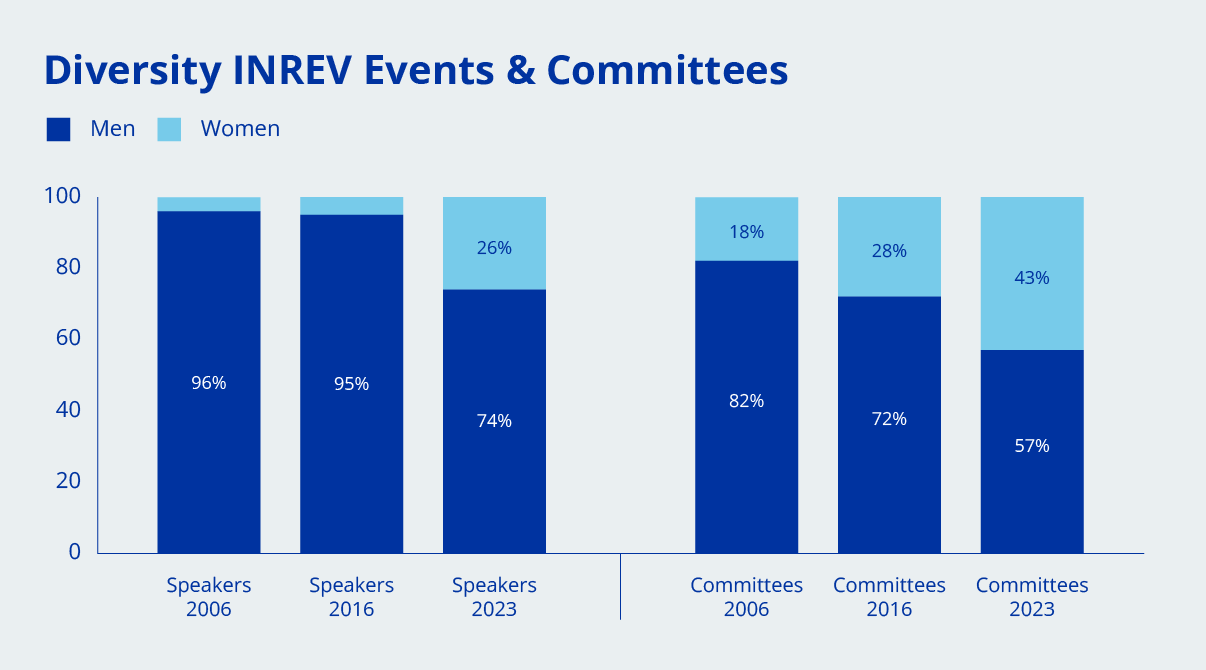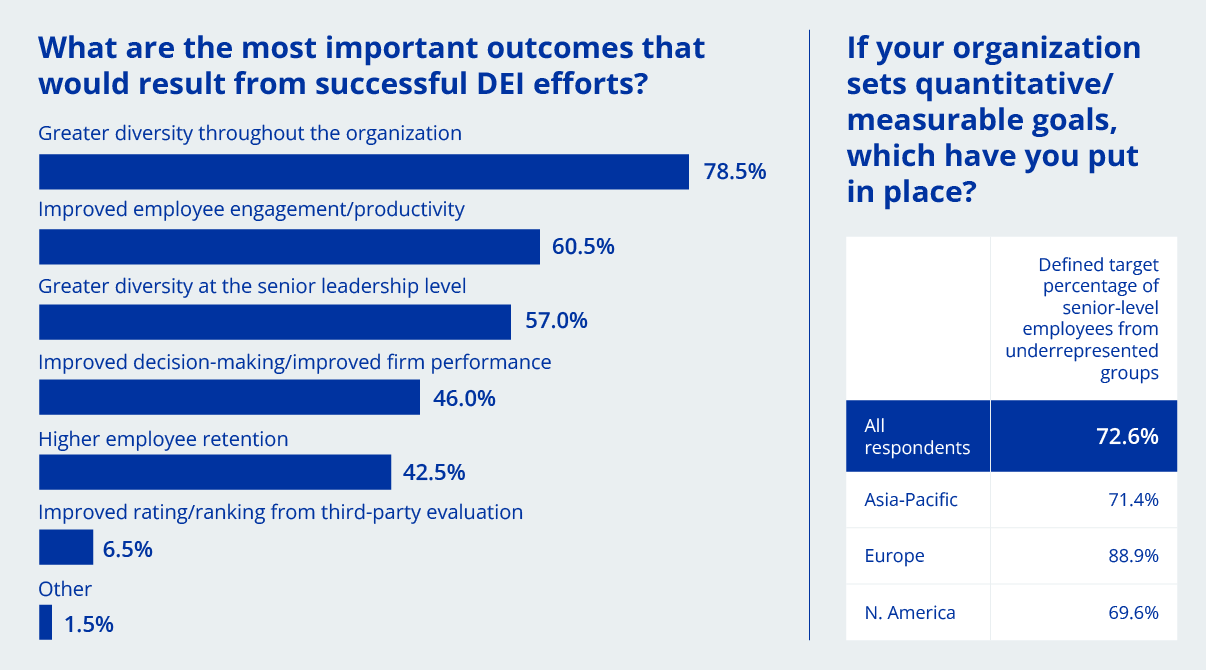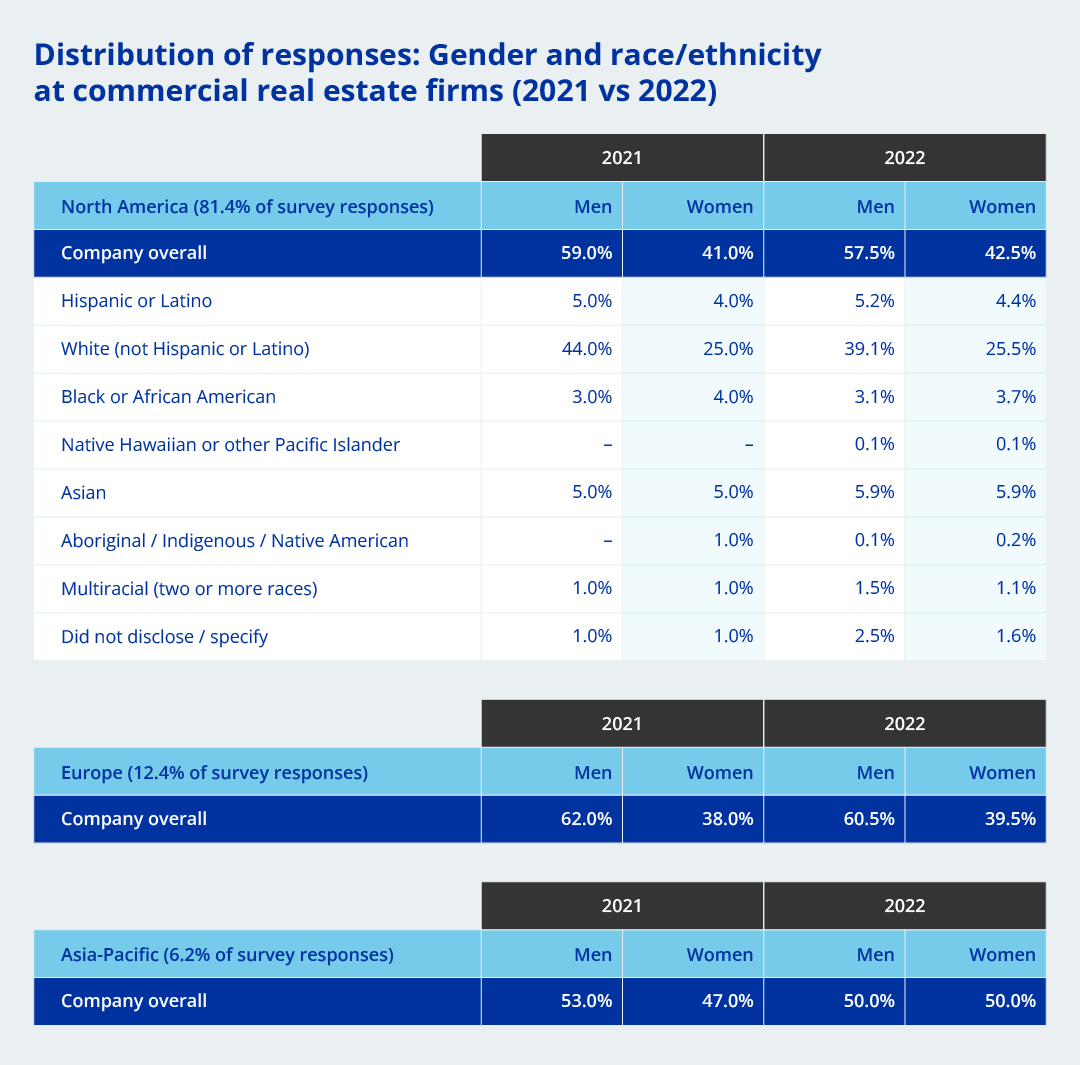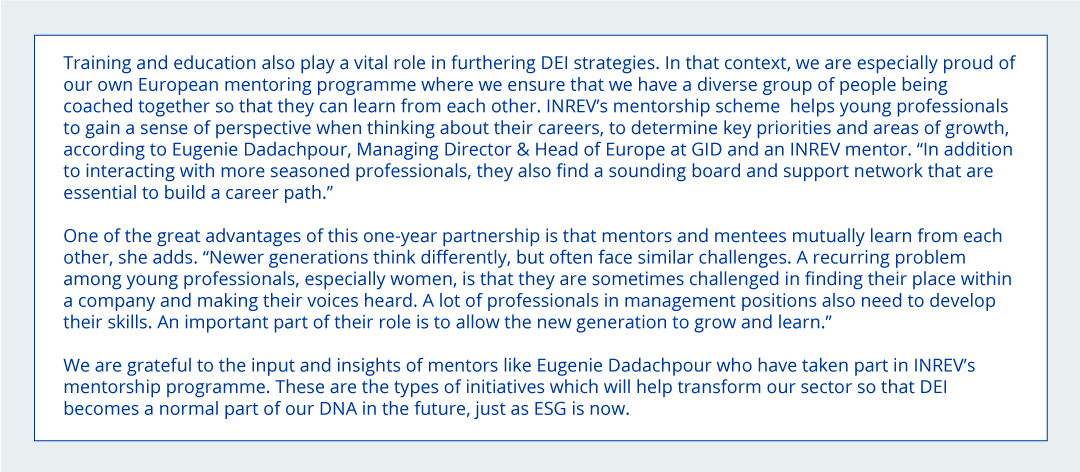Onwards and upwards to greater equality and diversity
Gender equality and other DEI matters may be rising up the agenda of European real estate companies, but there is plenty of room for improvement
Stay up to date!
Sign up for our newsletter to receive the latest INREV insights on DEI and other topics straight to your inbox.
The European real estate industry still has a long way to go to achieve greater gender equality, especially compared to other global regions including North America and Asia-Pacific. Nevertheless, the cultural shift needed to facilitate that transition and to further diversity, equity and inclusion (DEI) more broadly, is indisputably gaining momentum. INREV’s own track record highlights the positive trend: in 2006, only 13% of attendees at its annual conference were female. By 2024, that figure had almost doubled to 25%.
Other statistics likewise signal a favourable evolution in terms of gender equality in Europe. As an indication of how senior positions are distributed within the industry, we can look at the percentage of female speakers at INREV events which increased from a meagre 4% in 2006 to 38% in 2024. Our committees on topics ranging from corporate governance and due diligence to technology and research meanwhile display something approaching an equal balance between male and female members, with women accounting for 36% in 2024 compared to 18% in 2006. INREV is clearly doing its utmost to lead by example.

Source: INREV
More importantly, DEI is now firmly on the agenda of real estate companies across the industry. In fact, INREV’s 2024 Investor Intentions Survey revealed that a vast majority of European firms – or 73% of respondents – are putting a stronger focus on DEI programmes. That figure is significantly higher than the 57% reported in 2023.
Sophistication is increasing
An earlier survey conducted together with ULI in 2022 for our European members concluded that 92% of those polled already have formal DEI practices in place or initiatives to improve DEI. A growing number are meanwhile showing signs of increased sophistication on such matters: some are broadening schemes aimed at increasing the role of underrepresented groups at the top management levels as well as linking metrics such as compensation to outcomes, levelling pay disparities and facilitating inclusiveness.
In fact, Europe leads globally in terms of defining targets for the percentage of senior-level employees from underrepresented groups, according to data from the Global Real Estate DEI Survey in which INREV took part back in 2022 together with Ferguson Partners and six other industry associations (ANREV, NAREIM, NCREIF, PREA, REALPAC and ULI). Overall, respondents in that survey saw improved employee engagement and productivity, better decision-making and firm performance as well as higher employee retention as key outcomes of successful DEI efforts.

Source: Global Real Estate DEI Survey 2022
Europe also leads in addressing physical disability
While different countries and regions in Europe are moving at different speeds due largely to cultural differences, there are other indicators that DEI is becoming increasingly embedded in the corporate strategies of our members. Europe leads the way when it comes to addressing physical disability, according to the 2022 INREV/ULI survey.
No less than 81% of European respondents said they were sensitive to both visible and non-visible disabilities, with a sizeable number also making efforts to ensure interview processes are unbiased; to improve the physical office environment for neurodivergent needs; and to engage with third-party non-profit disability organisations. A high percentage – or 86% - of European firms also reported having initiatives that address race while 71% had policies around sexual orientation.
While the COVID-19 pandemic ushered in or accelerated major disruptions across the broader real estate investment industry, its impact on the movement towards greater gender diversity can only be described as positive. As many employees – both male and female – were forced to work from home, employers recognised that productivity could be maintained or even increased while their staff benefitted from a better work-life balance. Since then, real estate firms worldwide have shown a greater willingness to prioritise social goals and be flexible in terms of work location, nowadays a prerequisite for retaining young talent - male or female.
Interestingly, Europe leads on that indicator, according to the 2022 Global Real Estate DEI Survey. Some 80% of European respondents indicated that they give all employees the option to work remotely for at least part of the week. The global average is 61%.
But Europe lags behind other regions in gender equality
Many of INREV’s members are clearly making progress on the road towards greater gender equality and other DEI issues. But these bright spots cannot mask the hard truth that globally, Europe is the region with the lowest average proportion of women in commercial real estate, at 39.5% overall, according to the 2022 Global DEI survey. This compares to 42.5% for North America and 50% in Asia.
While these results are far from satisfactory, every European company that took part in the survey said gender was directly being targeted by its initiatives. Moreover, the figures reported here do not tell the whole story. INREV has so far participated twice in the Global DEI survey for the real estate industry, but this monitor has a longer history in the North American market. It was first held there in 2017 as part of an annual compensation study conducted by NAREIM and, due to its origins, still has a strong North American bias.

Source: Global Real Estate DEI Survey 2022
Only 12.4% of the global survey respondents were European
Additionally, only 12.4% of the 192 organisations that took part in the 2022 DEI Survey were respondents with operations in Europe. As a result, INREV’s European members were seriously underrepresented in the questionnaire as well as in the 2021 survey which marked our first participation. The findings of these two polls are not, therefore, unequivocally illustrative for the broader real estate market in this part of the world.
INREV is keen to address that situation and is taking initiatives to create greater awareness of the importance of DEI with a view to increasing participation from its European members in future global DEI surveys with its partners which will now be held biennially rather than annually. That said, our European members face barriers that respondents from other global regions do not. For example, the European Union’s General Data Protection Regulation attaches certain requirements and restrictions to processing (e.g., collection, storage, and use of) personal data.
GDPR therefore makes sensitive personal data subject to heightened protections. Broadly speaking, much of the data collected in a DEI programme qualifies as sensitive personal data which means that any personal information revealing racial or ethnic origin, political opinions, religious or sexual orientation may not be used.
Companies do not operate in a vacuum, so collecting and comparing data is key to successful benchmarking. However, between 17% and 35% of the international firms surveyed in the 2022 global DEI study said they were not legally entitled to gather information on various diversity dimensions, including socioeconomic background, religion, mental or cognitive disabilities, LGBTQ+ status, mental health conditions, physical disability, or refugee status. Some 24% of the European respondents in that study indicated that legal restrictions around collecting demographic data are a barrier to the success of DEI policies.
Cultural differences also play a role
Swedish real estate companies are a case in point: they are prohibited from collecting statistics based on ethnicity or religion. Even at a national level, there is no official population count of its five minority groups. Germany also has a very different approach to data collection than the US due to its modern history and culture. Indeed, in Germany, it is simply not acceptable to ask for any kind of diversity data to be submitted for ethnicity reasons.
Another challenge in Europe has to do with language barriers between people working in an organisation. Interviews with industry professionals have highlighted the reservations some employees have about talking about race for fear of using the wrong terms, or inadvertently causing offence.
One way of overcoming these restrictions is through voluntary data collection programmes, which can open the door for organisations to be more progressive. Some INREV members have indicated they are starting with a small step such as the introduction of voluntary reporting on pay. Such initiatives – which European firms, led by the UK, are now embracing – would help to push forward the topic and promote further transparency across the industry. This strategy is also widely seen as being one of the most impactful in terms of improving DEI. Moreover, by unlocking vital statistics, we will gain valuable insights into the current situation and what topics should receive the greatest priority.
Stand up and be heard!
Cultural shifts take time and developing new mindsets does too. However, the industry is moving in the right direction with a greater focus on DEI programme structures, resources and ownership. INREV has already picked up the baton -- our own team boasts more than 20 nationalities with ages ranging from early twenties to early sixties -- and we encourage our members to do the same. In fact, we are strong advocates of running the extra mile and call on all our members, whatever their gender, background, sexual preference or disability, to stand up and be heard.
On that front, we are fortunately seeing greater gender equality and diversity in INREV’s Young Professionals group. Fostering diversity among our young talent is a no-brainer as new generations of real estate professionals are generally more open to the concepts of equity and inclusion than some of their older peers. For many, DEI is even seen as a licence to operate, not just nice to have.













